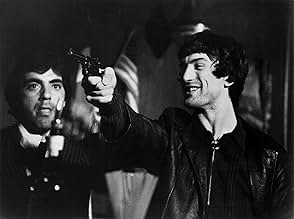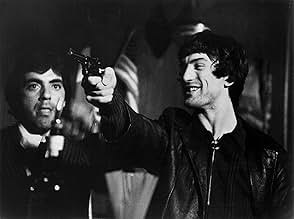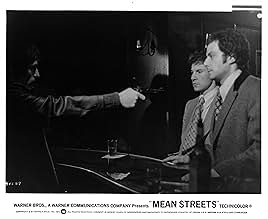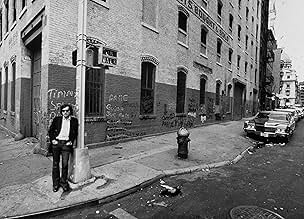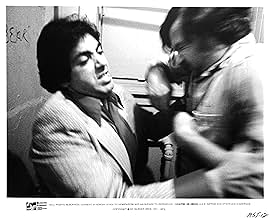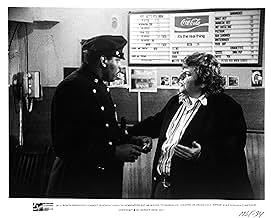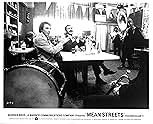Un delinquente da quattro soldi aspira a farsi strada nell'organizzazione criminale locale.Un delinquente da quattro soldi aspira a farsi strada nell'organizzazione criminale locale.Un delinquente da quattro soldi aspira a farsi strada nell'organizzazione criminale locale.
- Regia
- Sceneggiatura
- Star
- Premi
- 5 vittorie e 5 candidature totali
Victor Argo
- Mario
- (as Vic Argo, Victor Argo)
Murray Moston
- Oscar
- (as Murray Mosten)
Recensioni in evidenza
Scorsese's first film, the interesting catastrophe "Boxcar Bertha," marked his birth as a director, but it was with his second feature, "Mean Streets" that we witnessed the birth of an artist. Most of "Mean Streets" is slightly unfocused with a simplistic plot based around a lot of machismo grandstanding and long bouts of boring dialog (occasionally made interesting by DeNiro's off-kilter star-making turn as Johnny-Boy), with spats of visceral violence (far less gory here than in later Scorcese pics), and a visual bravado that seems slightly less disciplined but no less entertaining than your standard Scorsese crime flick.
Despite its drawbacks (mainly due to youth and inexperience), the template was set. The opening credits (done to the tune of "Be My Baby") suck you right into the film, and the rest of the movie is peppered with Scorsese's loving treatment of popular music that would later become one of his most endearing hallmarks. The basic premise featuring Harvey Keitel as Charlie (the young hood with a heart of gold and conflicted internally by the religion of the Church and the religion of the Streets), Robert DeNiro as Johnny-Boy (the equally loved and hated loose-canon brother figure), and Amy Robinson as Theresa (the woman our hero wants to put on a pedestal as a saint but often treats like a whore), is a trifecta of archetypes we see repeated again and again in Scorsese's films (most obviously in "Casino" with the DeNiro-Pesci-Stone characters, and most subversively in "The Last Temptation of Christ" with Jesus-Judas-Mary Magdalene). The religious iconography, the brotherhood of crooks, the attraction to the gangster lifestyle, the keen eye for depicting violence in artistic and startling ways...these are displayed here in "Mean Streets" in their rawest form.
Though flawed in many ways, "Mean Streets" set the stage and laid the the template for the type of film Scorsese would perfect seventeen years later with "Goodfellas." This heralded the arrival of a new talent and a new genre, and the world of film has thankfully never been the same.
Despite its drawbacks (mainly due to youth and inexperience), the template was set. The opening credits (done to the tune of "Be My Baby") suck you right into the film, and the rest of the movie is peppered with Scorsese's loving treatment of popular music that would later become one of his most endearing hallmarks. The basic premise featuring Harvey Keitel as Charlie (the young hood with a heart of gold and conflicted internally by the religion of the Church and the religion of the Streets), Robert DeNiro as Johnny-Boy (the equally loved and hated loose-canon brother figure), and Amy Robinson as Theresa (the woman our hero wants to put on a pedestal as a saint but often treats like a whore), is a trifecta of archetypes we see repeated again and again in Scorsese's films (most obviously in "Casino" with the DeNiro-Pesci-Stone characters, and most subversively in "The Last Temptation of Christ" with Jesus-Judas-Mary Magdalene). The religious iconography, the brotherhood of crooks, the attraction to the gangster lifestyle, the keen eye for depicting violence in artistic and startling ways...these are displayed here in "Mean Streets" in their rawest form.
Though flawed in many ways, "Mean Streets" set the stage and laid the the template for the type of film Scorsese would perfect seventeen years later with "Goodfellas." This heralded the arrival of a new talent and a new genre, and the world of film has thankfully never been the same.
Both Robert De Niro and Harvey Keitel are fantastic in Mean streets. I'm not a huge Robert De Niro fan as every time i see him act, i just think to myself that he Robert De Niro trying to be somebody. This is not the case in mean Streets for me. Instead he plays a kid who is young and stupid named Johnny boy. His performance is brilliant and is most likely one of his best. Keitel plays Charlie who looks out for Johhny. The opening line of the film basically tells you everything you would want to know about Charlie.
The film is gritty and shot in a documentary style with several tracking shots being carried out hand held. It takes the film 45 minutes to give you a clear plot and a clear understanding on what going to unfold. The last 20 minutes is directed perfectly with a palpable sense of suspense and is clearly the best ending you can give to this film. One negative would be that in the first half there literally no set pieces . Not a lot happens but saying this you get a clear understanding and fully engaged with the characters which makes the last 20 minutes outstanding.
It not the best film that Scorese has ever made but it clear by watching this that Mean Streets was his main starting point to his successful career
The film is gritty and shot in a documentary style with several tracking shots being carried out hand held. It takes the film 45 minutes to give you a clear plot and a clear understanding on what going to unfold. The last 20 minutes is directed perfectly with a palpable sense of suspense and is clearly the best ending you can give to this film. One negative would be that in the first half there literally no set pieces . Not a lot happens but saying this you get a clear understanding and fully engaged with the characters which makes the last 20 minutes outstanding.
It not the best film that Scorese has ever made but it clear by watching this that Mean Streets was his main starting point to his successful career
Martin Scorsese has made some brilliant movies in his life, but unfortunately this isn't one of them. I can't really call it bad, because the direction and the cinematography just drip with pure talent, but I have some major problems with the plot. Mainly, where the hell is it? The story doesn't just move at a slow pace, it appears to go in incredibly tiring loops. It starts of with Johnny Boy (a solid Robert DeNiro) owing a whole bunch of crooks money, which is a pretty riveting starting point. What does he do about it? What do the crooks do about it? Nothing, and that goes on for two hours. The whole movie appears to be Harvey Keitel endlessly saying he has to pay his debts, to which he refuses, to which he asks it again half an hour later, to which he like, makes up an excuse and goes to the movies, and all of it feels so redundant. The movie finally gets to the point in the end, but that doesn't really save it. It shows the sadness of the bad neighbourhoods in New York wonderfully, but that's really all I can say about it.
How can you endlessly watch a total screw-up borrow from the mob, annoy the only friend he has, and basically wreck his life without wanting to run away from it all? When the screw-up is played by young Robert DeNiro you are fascinated, you don't want to turn away. MEAN STREETS was not the debut of both Martin Scorcese or his stars Harvey Kietel and Robert deNiro. They struggled in the field for some time. This is the film that told the world, new head-honchos have arrived on the screen! MEAN STREETS tells of low-rent street hoods in Little Italy. Harvey Kietel plays the one hood whose a voice of reason, who doesn't mess up all the time, who is smart enough to avoid trouble. When DeNiro's Johnny Boy is first seen here, he is playing infantile tricks, and is telling his friend how he can't go in half the stores around him because he owes everybody money. Martin Scorcese uses a gritty documentary-shooting style to unfold his movie. It remains probably the best film of 1973 (But 1973 was not one of the best years for movies.)
Mean Streets has all the characteristics we have come to associate with Scorsese - the fluid camerawork, the expressionistic lighting, the sudden explosions of violence, the eclectic soundtrack. In later films, he took cinema to new heights with the flowering of his technical skills and the broadening of his material, but Mean Streets remains unsurpassed for the emotional intensity which only a young director, passionate about film and intent on making a personal statement, could achieve.
The theme of the film is contained in the famous first line 'You don't make up for your sins in church; you do it in the streets' (a Scorsese voice-over). An extended preface which delineates the nature of the film and its characters before the narrative begins includes brief cameo scenes introducing the four protagonists (a much copied device: see, for example, Trainspotting).
Scorsese's alter-ego is played as in the earlier 'Who's That Knocking At My Door?' by Harvey Keitel, giving the performance of his young life. He is Charlie, a junior member of a Mafia family who collects debts and runs numbers, but who also has aspirations to sainthood. The other key figure is his anarchic friend, Johnny Boy, played with ferocious energy by de Niro.
Charlie is introduced coming out of confession, dissatisfied with his penance. Reciting words doesn't mean anything to him and he can't believe that forgiveness could come so easily. Deliberately burning his hand in a candle flame is a more effective reminder of the pain of hell. The camera follows Charlie from the altar into Tony's bar, a red-lit inferno, and when Johnny Boy comes in, to the tune of Jumping Jack Flash, Charlie recognises that this is the form his penance will take. Johnny Boy is the cross he must bear. 'You send me this, Lord' he says resignedly.
Johnny Boy's irresponsibility and impulsiveness make him everything Charlie, with his controlled, anxious, guilt-ridden persona, is not. The argument which follows in the back room about Johnny Boy's debts deserves its reputation as one of the great scenes in seventies cinema.
Charlie's life moves in well worn, claustrophobic circles. Hardly anyone outside his immediate circle appears in the film and other ethnic groups are viewed with suspicion. The characters seldom appear outdoors or in daylight. Charlie inhabits a world of bars, pool halls and cinemas. In the one scene he appears in sunlight, he looks ill at ease. The suit and heavy overcoat he wears (reflecting his Mafiosi ambitions) look distinctly out of place on a beach. It's significant that in this scene Teresa, his girlfriend, scorns his small-time gangsterism and challenges him to join her in moving away to a new life. But Charlie is trapped by his desire to please his uncle.
Scorsese has said that his choice in adolescence lay between becoming a priest and becoming a gangster and that he failed on both counts. Mean Streets allows him to explore that choice to devastating effect.
The theme of the film is contained in the famous first line 'You don't make up for your sins in church; you do it in the streets' (a Scorsese voice-over). An extended preface which delineates the nature of the film and its characters before the narrative begins includes brief cameo scenes introducing the four protagonists (a much copied device: see, for example, Trainspotting).
Scorsese's alter-ego is played as in the earlier 'Who's That Knocking At My Door?' by Harvey Keitel, giving the performance of his young life. He is Charlie, a junior member of a Mafia family who collects debts and runs numbers, but who also has aspirations to sainthood. The other key figure is his anarchic friend, Johnny Boy, played with ferocious energy by de Niro.
Charlie is introduced coming out of confession, dissatisfied with his penance. Reciting words doesn't mean anything to him and he can't believe that forgiveness could come so easily. Deliberately burning his hand in a candle flame is a more effective reminder of the pain of hell. The camera follows Charlie from the altar into Tony's bar, a red-lit inferno, and when Johnny Boy comes in, to the tune of Jumping Jack Flash, Charlie recognises that this is the form his penance will take. Johnny Boy is the cross he must bear. 'You send me this, Lord' he says resignedly.
Johnny Boy's irresponsibility and impulsiveness make him everything Charlie, with his controlled, anxious, guilt-ridden persona, is not. The argument which follows in the back room about Johnny Boy's debts deserves its reputation as one of the great scenes in seventies cinema.
Charlie's life moves in well worn, claustrophobic circles. Hardly anyone outside his immediate circle appears in the film and other ethnic groups are viewed with suspicion. The characters seldom appear outdoors or in daylight. Charlie inhabits a world of bars, pool halls and cinemas. In the one scene he appears in sunlight, he looks ill at ease. The suit and heavy overcoat he wears (reflecting his Mafiosi ambitions) look distinctly out of place on a beach. It's significant that in this scene Teresa, his girlfriend, scorns his small-time gangsterism and challenges him to join her in moving away to a new life. But Charlie is trapped by his desire to please his uncle.
Scorsese has said that his choice in adolescence lay between becoming a priest and becoming a gangster and that he failed on both counts. Mean Streets allows him to explore that choice to devastating effect.
What Scorsese Film Ranks Highest on IMDb?
What Scorsese Film Ranks Highest on IMDb?
Cinema legend Martin Scorsese has directed some of the most acclaimed films of all time. See how IMDb users rank all of his feature films as director.
Lo sapevi?
- QuizFrancis Ford Coppola contributed money to the budget of the film. However, it is rumored that he lent Martin Scorsese $3000 as the Mafia shook him down for using the San Genaro Festival as a backdrop without "permission". It's generally presumed the Mafia uses the all-cash festival to launder money from their ill-gotten gains.
- BlooperYou can see Robert De Niro's mic pack on his back when he gets up to walk to the window at Charlie's house after staying the night.
- Citazioni
[first lines]
Voice in Charlie's Mind: You don't make up for your sins in church. You do it in the streets. You do it at home. The rest is bullshit, and you know it.
- Versioni alternativeNBC edited 10 minutes from this film for its 1977 network television premiere.
- ConnessioniEdited into American Cinema: Film Noir (1995)
- Colonne sonoreJumpin' Jack Flash
Written by Mick Jagger (as M. Jagger), Keith Richards (as K. Richards) (uncredited)
By The Rolling Stones
Courtesy of ABKCO Records
I più visti
Accedi per valutare e creare un elenco di titoli salvati per ottenere consigli personalizzati
- How long is Mean Streets?Powered by Alexa
Dettagli
- Data di uscita
- Paese di origine
- Sito ufficiale
- Lingue
- Celebre anche come
- Calles peligrosas
- Luoghi delle riprese
- Aziende produttrici
- Vedi altri crediti dell’azienda su IMDbPro
Botteghino
- Budget
- 500.000 USD (previsto)
- Lordo Stati Uniti e Canada
- 32.645 USD
- Fine settimana di apertura Stati Uniti e Canada
- 32.645 USD
- 15 mar 1998
- Lordo in tutto il mondo
- 61.676 USD
- Tempo di esecuzione
- 1h 52min(112 min)
- Colore
- Proporzioni
- 1.85 : 1
Contribuisci a questa pagina
Suggerisci una modifica o aggiungi i contenuti mancanti





